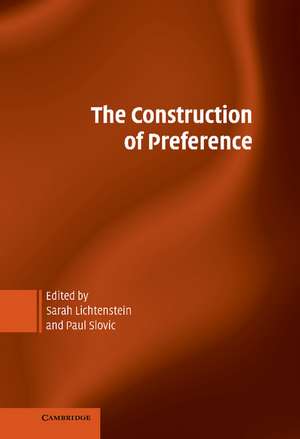The Construction of Preference
Editat de Sarah Lichtenstein, Paul Slovicen Limba Engleză Hardback – 17 sep 2006
| Toate formatele și edițiile | Preț | Express |
|---|---|---|
| Paperback (1) | 470.65 lei 6-8 săpt. | |
| Cambridge University Press – 27 aug 2006 | 470.65 lei 6-8 săpt. | |
| Hardback (1) | 777.40 lei 6-8 săpt. | |
| Cambridge University Press – 17 sep 2006 | 777.40 lei 6-8 săpt. |
Preț: 777.40 lei
Preț vechi: 903.96 lei
-14% Nou
Puncte Express: 1166
Preț estimativ în valută:
148.78€ • 153.69$ • 123.82£
148.78€ • 153.69$ • 123.82£
Carte tipărită la comandă
Livrare economică 26 martie-09 aprilie
Preluare comenzi: 021 569.72.76
Specificații
ISBN-13: 9780521834285
ISBN-10: 0521834287
Pagini: 810
Ilustrații: 62 tables
Dimensiuni: 156 x 234 x 43 mm
Greutate: 1.23 kg
Editura: Cambridge University Press
Colecția Cambridge University Press
Locul publicării:New York, United States
ISBN-10: 0521834287
Pagini: 810
Ilustrații: 62 tables
Dimensiuni: 156 x 234 x 43 mm
Greutate: 1.23 kg
Editura: Cambridge University Press
Colecția Cambridge University Press
Locul publicării:New York, United States
Cuprins
Part I. Introduction: Preface; Acknowledgements; 1. The construction of preference: an overview; Part II. Preference Reversals: 2. Relative importance of probabilities and payoffs in risk taking; 3. Reversals of preference between bids and choices in gambling decisions; 4. Response-induced reversals of preference in gambling: an extended replication in Las Vegas; 5. Economic theory of choice and the preference reversal phenomenon; Part III. Psychological Theories of Preference Reversals: 6. Contingent weighting in judgment and choice; 7. Cognitive processes in preference reversals; 8. The causes of preference reversal; 9. Preference reversals between joint and separate evaluations of options: a review and theoretical analysis; 10. Attribute-task compatibility as a determinant of consumer preference reversals; 11. Preferences constructed from dynamic micro-processing mechanisms; Part IV. Evidence for Preference Construction: 12. Construction of preferences by constraint satisfaction; 13. Coherent arbitrariness: stable demand curves without stable preferences; 14. Tom Sawyer and the construction of value; 15. When Web pages influence choice: effects of visual primes on experts and novices; 16. When choice is demotivating: can one desire too much of a good thing?; Part V. Theories of Preference Construction: 17. Constructive consumer choice processes; 18. Decision making and action: the search for a dominance structure; 19. Pre- and post-decision construction of preferences: differentiation and consolidation; 20. Choice bracketing; 21. Constructing preferences from memory; Part VI. Affect and Reason: 22. Reason-based choice; 23. The affect heuristic; 24. The functions of affect in the construction of preferences; 25. Mere exposure: a gateway to the subliminal; 26. Introspecting about reasons can reduce post-choice satisfaction; Part VII. Miswanting: 27. New challenges to the rationality assumption; 28. Distinction bias: misprediction and mischoice due to joint evaluation; 29. Lay rationalism and inconsistency between predicted experience and decision; 30. Miswanting: some problems in the forecasting of future affective states; Part VIII. Contingent Valuation: 31. Economic preferences or attitude expressions?: an analysis of dollar responses to public issues; 32. Music, pandas, and muggers: on the affective psychology of value; 33. Valuing environmental resources: a constructive approach; Part IX. Preference Management: 34. Measuring constructed preferences: towards a building code; 35. Constructing preferences from labile values; 36. Informed consent and the construction of values; 37. Do defaults save lives?; 38. Libertarian paternalism is not an oxymoron; References; Index.
Descriere
Describes the concept of preference construction within psychology, economics, marketing, law, and environmental policy.






















